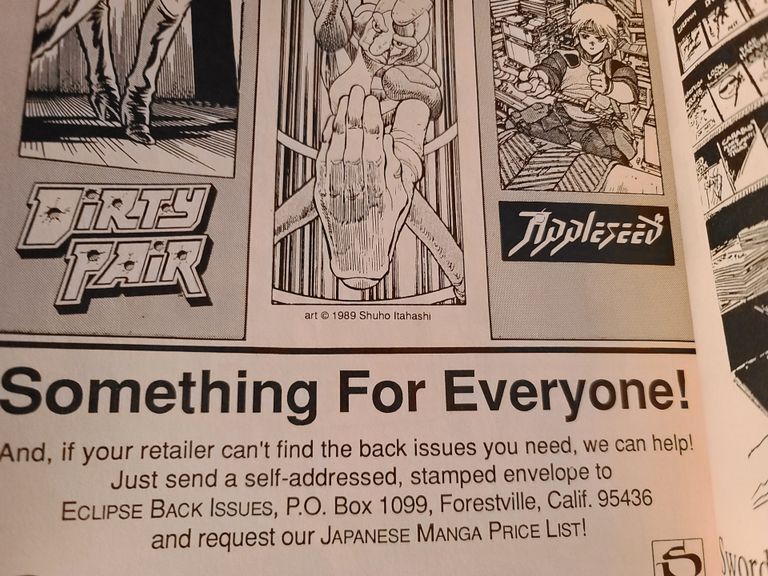
I was reading an older manga that was adapted into the Western comic format (Cyber 7) from Eclipse Comics and I saw this ad in the back of the book. It shows off something that's a rarity in the modern comic book world.
Smaller indie publishers will still sell back issues directly to customers, but try getting back issues from a major publisher. You're not going to be able to do it except in digital form.
In the old world of comics, most ongoing titles could be jumped into in most any issue and the title would be at least somewhat friendly to a new reader. But the new world isn't always as friendly. Jumping into Batman in the last several years would have presented the reader with an almost incomprehensible multi-layered mess from Tom King, whether we're talking issue 20 or 50 or 70. The ongoing Justice League titles are another victim of that, Justice League Odyssey was a 25 issue run of a single plotline. It maybe had one good jumping on point aside from the issue 1, but the further into the series it progressed the more knowledge of previous issues was required.
In a world like that, where you have to know the context to really make sense of a title, it seems like back issues are more valuable than ever - and more inaccessible from major publishers than ever. At least comic book stores will still sell you back issues (if they have them in stock) even if you can't always get them from the publisher directly.
It's an understandable position by the big publishers. Stock on-hand means you're paying warehousing fees for the product, increasing overhead. Worse when it's being held in Diamond's warehouse where there are more fees stacking up to hold onto those books so Diamond can fill orders. (I haven't heard a lot about how Lunar/UCS work and if it's much the same as Diamond's policies so I omit them as examples.) Instead of paying those warehousing fees, the big two take their surplus books, bundle them up, and ship them off at discounted prices to Wal-Mart, Five Below, and other retailers.
One of the stated reasons for reboots and renumberings in the comic book industry is to make it easier for customers to be able to jump into a book by providing a fresh start. That's laudable; I think it's evident that for an industry to survive it needs to be able to pull in new readers.
But I think it shows a dichotomy between the old ways and the new ways. That new way, the constant reboots (how many Captain Marvel reboots have there been in the last few years?) has hit the point of diminishing returns. New #1s aren't sustaining the industry, and the drop off from the 1st issue to the 2nd and 3rd is precipitous.
In the old way, you actively had publishers trying to sell their products, new and old, to readers. The experience was less "Here is this milestone super important issue" with all of its gimmick-driven faults and more a welcoming one of "Hey so you liked this Spider-Man book? Guess what, here are many more books that you might like. Check some out. --Stan."
The margins on comic products is low enough that it doesn't make sense to warehouse a large amount of product, so shipping it out to discounted sales makes sense. It keeps revenue coming in, and keeps costs low. I don't think it provides for an optimal experience for new readers, gatekeeping comic issues behind stores or behind eBay instead of letting new readers reach out directly to the publishers to pick up titles. Heck, how often do you even see a comic store advertise in a mainstream comic book? Not that often!